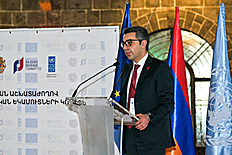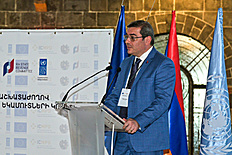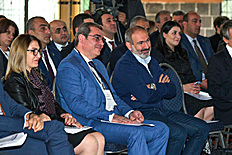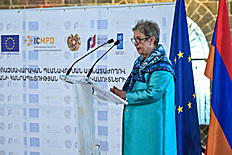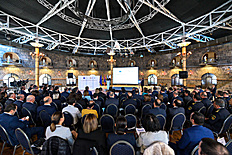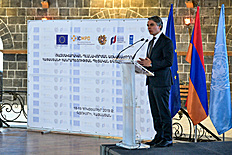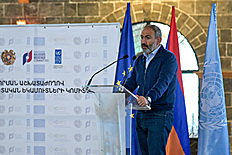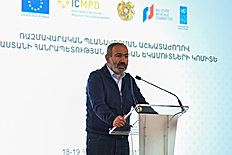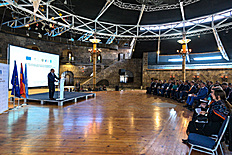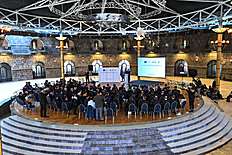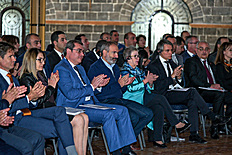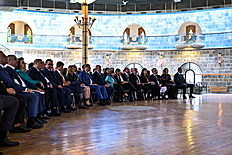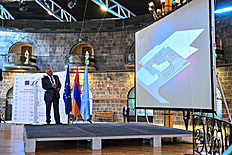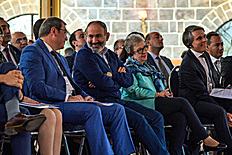Press releases
PM: “By making mandatory contributions to the Treasury, citizens pay for themselves, they pay for having infrastructure in our country”
more 11 photos
Prime Minister Nikol Pashinyan participated in the Strategic Planning Workshop organized by the State Revenue Committee in Gyumri.
SRC Chairman David Ananyan, Head of EU Delegation to Armenia Andrea Victor, and UNDP Resident Representative in Armenia Dmitry Mariasin attended and addressed the event.
Welcoming the participants of the workshop, the Prime Minister noted that one of the main issues in the context of the development of our statehood was the lack of high quality sector strategies and lack of sufficient level of interconnection with other existing sector strategies.
“Our government has set a goal for us to put in place strategies that will result in short, medium and long-term strategies. I am glad that the State Revenue Committee has been steadily moving in this direction.
I would like to point out that, in general, I am satisfied with the work of the SRC and would like to state that the SRC has resolved my problems in macro-level, but there are still many issues to be resolved in micro-level. In this regard, the adoption of the strategy is important for the implementation of solutions,” Nikol Pashinyan said.
According to the Prime Minister, strategy is understood to mean administration, improvement of procedures, service delivery. “The SRC’s task is to change the attitude of the citizen towards his / her taxes, tax liabilities, but it should be noted that for this purpose SRC employees must change their attitude towards their work and change their attitude in their contacts with citizens.
This is a two-way process and it It should take place under the auspices of the government, and the government should encourage citizens and SRC employees to make these changes.
At the same time, I consider it important for citizens to clearly state that the money they pay to the state through the SRC, they pay for themselves, they pay for their country, our country, infrastructure, services and education.
You should agree that it would be strange if every citizen built their own way, school, state institution for himself. The taxes they pay are invested in their own future, the future of their own children.
In order for this perception to reach its peak, it is crucial that there is a qualitative change in the tax and customs spheres and a qualitative change in the work of the government in general. How much citizens pay taxes depends in large part on how those taxes are spent,” Nikol Pashinyan said.
The Prime Minister emphasized that the government considers the fight against corruption in particular tax and customs important, but also recognizes that besides political will to solve this problem it is necessary to go for other solutions, including continuous salary increases.
“But this must inevitably be followed by a continuing increase in the professional level of tax and customs officials. Of course, it is a priority for us to bring forward the qualitative changes, because they are the factors that will legitimize the increase in salaries for the government and the public, and we must go that way,” he said.
The Premier wished the workshop successful proceedings, as well as progress and new achievements to the State Revenue Committee and the Government in dealing with the aforementioned issues.
“We are talking not only about the quality of services we will provide, but also about the capital investment opportunities we have and how they will stimulate economic growth so that our state revenues grow each year.
Of course, the fight against shadow is not on our agenda in any way, we have had unprecedented achievements in this regard, but I would also like to emphasize that I do not consider these successes to be the most and we must consistently go this way, constantly increasing the tax-GDP ratio.
The promotion of economic activity should be a priority, which has not only the financial but also psychological component and the mood and disposition of business entities is largely conditioned by the cooperation with the tax and customs authorities. I am sure that this quality will increase and I encourage all of you to move that way clearly and unambiguously,” Nikol Pashinyan concluded.
During the workshop, SRC Chairman Davit Ananyan delivered a presentation, entitled “The Road to SRC Modernization: Latest Developments.” SRC Advisor Aram Tananyan presented the modernization project of Meghri checkpoint and the establishment of a center for foreign economic activity in Gyumri.
The SRC 2020-2024 Strategic Development and Administration Plan was next presented during the workshop. The Strategy outlines the SRC’s key activity vectors and the reforms to be implemented over the next five years, the projects and the set of measures to facilitate their implementation, as well as their impact and forecasts on macroeconomic indicators.
The strategic measures will help boost efficiency in tax and customs administration through analytical tools, wider scope of services provided to taxpayers and technology-based optimization solutions.
The workshop was organized within the framework of the Assistance to Armenia in Migration and Border Management (MIBMA) project funded by the European Union and implemented in cooperation with the UN Development Program and the International Center for Migration Policy Development in Armenia.
